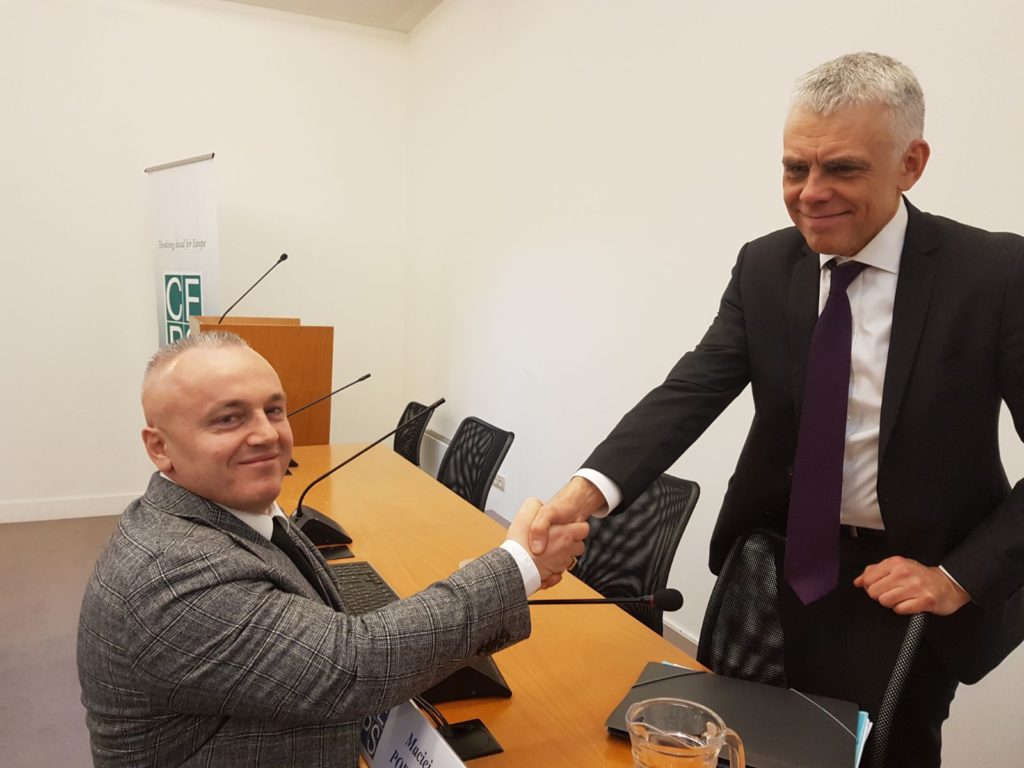On 8 February 2018, the Center for European Policy Studies and Mr. Maciej Popowski, Deputy Director General for Neighbourhood and Enlargement Negotiations of the European Commission, invited representatives from international institutions for the first public discussion after the presentation of the new Strategy Paper on the Accession Talks with the Western Balkans. The president of the Democratic Foundation of Chameria Festim Lato and Mr. Jeroen Zandberg were also invited, which provided an opportunity to inform the Deputy Director General and the other participants of the Cham issue.
At the meeting, the Deputy Director General explained the views of the Commission and provided an overview of the steps taken to come to this new strategy. This new framework provides an incentive for the applicants to reform and meet EU standards. It gives them a genuine opportunity and perspective to join the EU, without placing a fixed deadline on when an applicant can become a new member.
In the strategy presented on 6 February 2018 the Commission made a clear statement that the EU will not accept new members who have unresolved and lingering issues with their neighbours.
A major challenge for Chameria is the fact that the Cham issue is unresolved due to the political position of an established EU Member State, namely Greece, and not an aspiring one, Albania. In that sense the Cham issue is very comparable to the Macedonia issue. Greece has blocked Accession Talks with FYROM for many years in order to prevent it from adopting the name Macedonia and thereby claiming part of the perceived exclusive Greek historical heritage. The situation of Kosovo is another example, where several countries, like Spain, don’t recognize its independence in fear of it becoming an example for separatist groups in their country.
This topic was also brought up in the discussions with the Deputy Director General. Following the question on what the role of the EU will be in the case of Chameria and the clash of interests between the applicant Albania and the established Member State Greece, several responses were put forward; some more diplomatic than others.
Following an intervention by President Festim Lato and Mr. Jeroen Zandberg about the situation of the Cham, a representative from a Greek organisation commented that it was not for the Greeks to solve the Cham issue but that it was for the Cham to offer their apology for not standing by the Greeks during World War Two. Repeating the narrative of historical inaccuracies that subsequent Greek governments have used to deny the Cham community their rights as victims of injustice.
One extreme position that was taken is that the EU has an obligation to follow the Member State. This would mean that any of the 27 EU countries can say that they will not accept the opening of negotiations until their views are fully implemented by the applicant country, even if they are unreasonable and not in the interests of the EU as a whole. Another position takes a more collaborative approach. What will the EU say? There is a compromise on the table and you have to accept it?
The position of the Cham is that it is the obligation of Member States, Applicant States and the EU to work towards a framework in the Balkans and elsewhere that does justice to all nations and peoples and which is based upon the European values of human rights, democracy, the Rule of Law and the acceptance of minority rights.
Important challenges for the Commission will be to find a way to balance the interests of the various Member States, Applicant States and the collection of values that make up the core fabric of the Union. Furthermore, the Commission also has to keep an eye on the geopolitical threats and opportunities that linger in the struggle to keep the Balkans within the European family. The Cham issue is one of the main unresolved issues in the Western Balkan and it will undoubtedly be a topic in the upcoming negotiations between the various political actors.
